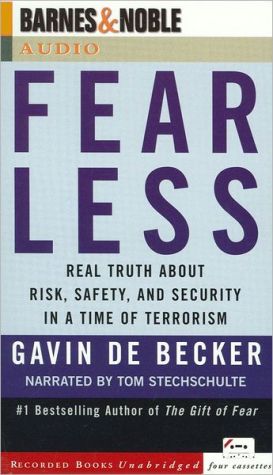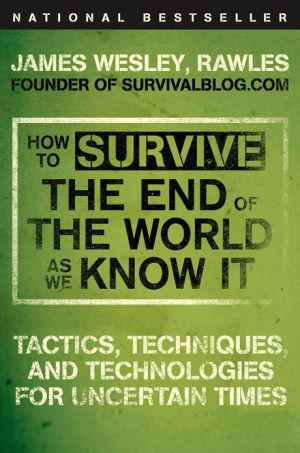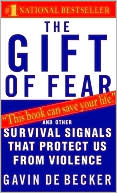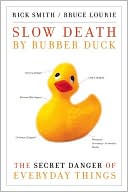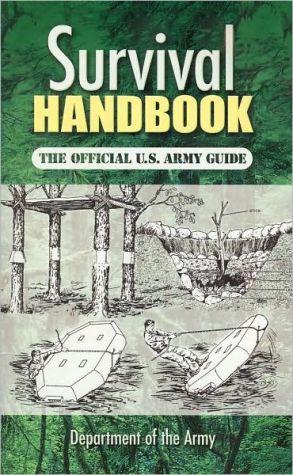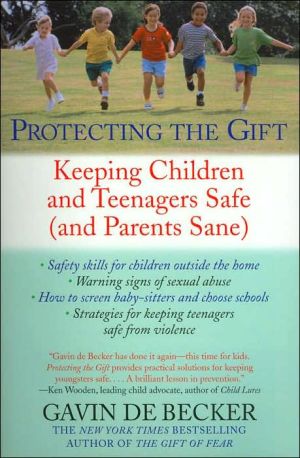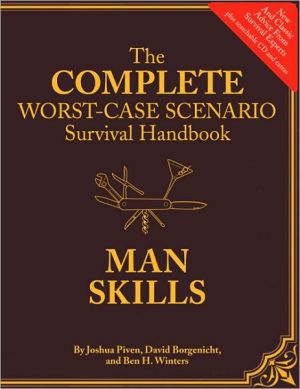Fear Less: Real Truth About Risk, Safety, and Security in a Time of Terrorism
Gavin de Becker's landmark book The Gift Of Fear showed millions of readers how to better protect themselves from violence and unwarranted fear. Now, in Fear Less, de Becker answers the questions many Americans have been asking since September 11th: \ \ Can air travel be safe?\ What is the risk of biological or chemical attack?\ Can the government detect and prevent future acts?\ How can we best talk to our children about what has happened and what might happen?\ What can we do to reduce fear...
Search in google:
Gavin de Becker's landmark book The Gift Of Fear showed millions of readers how to better protect themselves from violence and unwarranted fear. Now, in Fear Less, de Becker answers the questions many Americans have been asking since September 11th: Can air travel be safe? What is the risk of biological or chemical attack? Can the government detect and prevent future acts? How can we best talk to our children about what has happened and what might happen? What can we do to reduce fear and worry? What specific steps can we take to reduce terrorism? What are terrorists likely to do next? Most simply, is everything going to be all right? De Becker says, "Just as your imagination has placed you in frightening situations, it is now time to place yourself in empowering situations, time to see that you have a role to play, and contrary to so many TV news stories, it isnit just victim-in-waiting." Fear Less offers specific recommendations that can enhance our national security and our individual safety d and help put fear into perspective. Nobody in the world understands risk and safety better than Gavin de Becker. At a time of uncertainty, terrorism, and a whole new set of rules, it is hard to imagine a more important, more reassuring, and more necessary book than Fear Less. Author Biography: Gavin de Becker is widely considered America's leading expert on predicting and managing violent behavior. He advises such clients as the C.I.A. and the United States Supreme Court, and his 70-member firm has protected clients from terrorism in Israel, Southern Africa, Europe, and South America. Thisthree-time presidential appointee designed the assessment systems used to screen threats to all federal judges and the governors of eleven states, and his work has changed the way the U. S. government protects its highest officials. Mr. de Becker is a Senior Fellow at UCLA is School of Public Policy and Social Research.
Fear Less\ \ By Gavin de Becker \ Little, Brown\ Copyright © 2002 Gavin de Becker\ All right reserved.\ ISBN: 0-316-08596-0 \ \ \ \ Chapter One\ THE ILLUSION OF POWERLESSNESS \ Soon all the planning would pay off and this odd double life would come to an end. A few people in the Florida cell had actually enjoyed living as Americans, but during refresher training in Europe, they were reminded that the United States was against everything they believed in.\ The most committed among them found Americans objectionable, but it would be worth all the waiting and all the hating when news reached home that they had accomplished what was always believed to be impossible: striking America hard from within. Theirs was an enormous undertaking, far bigger than the sleeping giant would ever have dreamed, but the mission statement was simple: Start with several shocking blows at once, and then deliver grief in new ways for a long while.\ Every day, their training proved its value: Know how to blend in, conceal your identity, learn the culture, read American newspapers, study the transportation system. Stay focused, and what you do will change everything.\ It did change everything, though the top people in the operation would not live to see it happen.\ These facts have become famous since September 11, 2001, but the story you just read is about another terrorist operation, one you likely never heard of, one that was discovered and completely neutralized by the FBI. At first, federal officials were hesitant to believe the sheer ambition of the plot, but as they learned more they undertook one of America's largest manhunts -in total secrecy. At times during the case, members of several linked cells were spread all around the country, and FBI agents were fighting the calendar to stop the violence that was scheduled to begin on the Fourth of July. Only three weeks before that date, the full extent of the terror plan was uncovered, though it almost wasn't.\ A young woman named Farrar Teeple was taking an evening walk along the wide, empty beach near her father's home on New York's Long Island. Some motion in the dunes caught her eye, and although the light was low, she could make out a group of men. Were they burying something in the sand? She strained to see. The cool night air turned abruptly cold for Farrar when the men suddenly stopped what they were doing, stood up straight, and stared toward her. They did not speak or move and neither did she. For a moment she tested the welcome thought that they didn't see her, but she had to let it go when one of the men broke from the group without a word to the others and walked stiffly in her direction. He waved a few times, beckoning her toward him, but instead she backed up, then turned and ran quickly home. Panting as she entered the house, she told her father what she'd seen, thinking he would call the police. Instead, he reassured her that nobody doing anything suspicious would have waved at her and that it was nothing to bother the police about. Reluctantly, she accepted her father's judgment, but her intuition knew something was very wrong, and her intuition was very right.\ Another person on the beach that night, John Cullen (an American hero you've never heard of), acted more decisively on his intuition. He smelled something unusual in the briny air, a strong smell that drew him down the beach toward those same men that Farrar had seen. He thought it might be something burning, but as he got closer he felt certain it was the smell of diesel fuel. That made him curious, and his curiosity led him to call officials at a nearby Coast Guard station. The next morning, FBI agents searching the beach found what those silent men had hurriedly buried in the sand: boxes containing explosives, guns, ammunition, timers, shortwave radios, fuses disguised as pen-and-pencil sets, and devices that carried sulfuric acid. It was clear the terrorists planned to come back for those things later, but as federal agents knelt on the beach anxiously taking notes, the ruthless conspirators were already on a train bound for New York City. That's where they intended to carry out the instructions they'd been given: Detonate bombs in Jewish-owned department stores, place bombs on bridges from Queens to the Bronx, and cause terror and panic in any way you can.\ FBI investigators unraveled the plan completely, and even solved the mystery of that smell of diesel. It was caused by something nearly unimaginable given that it was 1942: the submarine that had traveled from Nazi Germany to deposit those men on the beach. (Another Nazi sub had dropped a second team of terrorists at Ponte Verde Beach, Florida.) Within weeks, the FBI had conducted a series of secret raids, eventually arresting 192 people in several cities. They had prevented state-sponsored terrorism at its most frightening, given the state that did the sponsoring.\ Some might assume that the foiled Nazi terrorist plan in the 1940s differs in fundamental ways from current terrorist operations, or that the world was a more innocent place then. Neither assumption is accurate.\ I'll share the diabolical details of this thwarted terrorist operation-and others-in later chapters, but for now it can remind us that violent plots against America are not new and that even suicidal ones are not fated to succeed in every case.\ After the terrible events of September 11, many people mistook our enemies for superhuman, when they were merely antihuman. Occasionally effective, to be sure, but our enemies are not powerful or ubiquitous. Those words more accurately describe us; we just forgot that for a while. It is sobering to acknowledge that we cannot protect all possible targets, but it is also true that our enemies cannot attack all possible targets. Conspiratorial behavior, scurrying in darkness, hiding behind false identification, pre tending, relying upon surprise-these are the only strategies of battle for people who never, ever do actual battle. In that sense, it flatters them to call this a war. In another sense, though, it is a war, a war to be won through deploying more cleverness and intuition than our enemies.\ Take, for example, the instructors at the Pan Am International Flight Academy in Eagan, Minnesota. They had a Middle Eastern student who said he wanted to learn to fly a jet but didn't want to learn about landing or taking off-skills most aspiring pilots are highly motivated to master. Because a couple of people listened to their intuition and called the FBI in August of 2001 (a month before our imaginations were so painfully expanded), and because the FBI took Zacarias Moussaoui into custody, we didn't have to find out the hard way exactly what it was he had in mind. It's fair to assume now that he was just a few weeks away from doing something terrible.\ That's a frightening thought, but just one of many frightening thoughts you've had to host, so of course you've felt fear about terrorism. How could you not? Nobody could witness what you witnessed, even if through the small window of television, and not react with shock and fear. As I've reminded many victims of violence many times, your defense system is designed to send the fear signal when it perceives enormous danger-and your defense system had never before assessed anything quite like what happened on September 11, or what's been happening since.\ Should you feel fear? The question is irrelevant, for there is no should about fear. Of course you will feel fear when there is reason to, like it or not. Fear is as fast as the jets, as hard as the buildings, as thick as the smoke, as undeniable as the rubble, and far more powerful than the hate and anger that brought them all together and tore them all apart right in front of your eyes.\ Fear is, and is supposed to be. Start there, accept it, and give yourself some of the same compassion you've so willingly extended to others since September 11.\ Yes, you had it better than many, but yours was still a profound personal experience of violence, and it would not be compassionate to expect anyone, including you, to have put events instantly into perspective. You had nothing to compare it to, and you couldn't get far enough away to see it in context. Even context itself was changed. Life could not be woven together that Tuesday with the same thread you had used on Monday. That alone is frightening, and can be enlightening-but not until after we've fully felt the fear.\ We gave lots of attention to what we saw on television, but something was going on inside each of us as well. The human brain, nature's most miraculous accomplishment, is never more effective than when its host may be at risk. Then, all internal resources are marshaled: experience, imagination, industriousness, intellect, creativity, memory. The brilliant soldiers of intuition are given strict orders to guard the exits; nobody goes off duty until you get the answers to questions posed by every cell in your body: What does this event mean to safety? Am I going to be all right? Are we all going to be all right?\ Of course you imagined a thousand terrors; that's where terrorism really happens: in the imagination. You placed yourself in those planes and in those buildings and imagined everything you could. You walked yourself through previously inconceivable emergencies. If you didn't do it consciously, you did it in your dreams. And even if you don't recall the dreams, they are in your cells nonetheless. For a while, the sound of an airplane overhead transported you to undesired destinations in the memory, and even the image of an airplane in an advertisement or the sight of one against a distant sky awakened unwelcome ghosts.\ Skulking among the frightening outcomes you could conjure was one you'd never even considered: the weaponizing of jetliners. What do you do with that? While those afraid of flying can choose to stay off planes, it isn't possible for people to avoid all places on the ground that might be targeted. Terror that rains down unpredictably from the sky touches as delicate a place in our minds as terror that rises from the deep; to the psyche, jets become giant man-eating sharks racing toward us with sinister determination. You could try ordering these intruders out of your mind, but all the exits were closed. Terror got in, but none got out.\ It is also profoundly disturbing to have a rageful, committed enemy that you cannot see advancing. A nation warring upon us would seem a luxury by comparison because a nation has a fixed place on the planet Earth, terrain and geography we can know, resources we can evaluate. And a nation -unlike suicidal individuals-has something to lose. In our present situation, no decisive or traditional victory is possible. In this war, there will be no captured beachhead upon which we can lay our fears to rest. So we are challenged to find safety and peace of mind in other ways.\ Yet, peace of mind seems difficult given what's been occupying the national dialogue: viruses, chemicals, cockpit doors, anthrax spores, decontamination teams, water supplies, FBI warnings, vaccinations, explosive devices, subways, fighter jets, gas masks, box cutters.\ Just try to build a world that feels safe with these materials and it collapses under its own weight. When the thoughts you'd normally banish seem vital to your survival, you're reluctant to turn them off-and it's harder still when fear is sprayed at you like tear gas from every TV newsroom on every channel nearly every hour of every day. Next up, another terrible thing from someone else's imagination. Next up, another expert in some terrible science. Next up, another nightmare.\ In order to get back to day-to-day life, you've had to place events and information into some vague framework. But so many questions linger just beneath consciousness, and so many answers you settled on tentatively call out for affirmation. Who is right-the reassuring public official on the news or the alarming public official in the segment that follows?\ It's too hard to be on duty without a break. It's too hard to keep up with every new risk. It's too hard to be anxious all the time. It's too damn hard.\ It's stressful to live like this, and it is natural for tension to seek resolution. Stretch a rubber band and it snaps back when you let go-but never all the way. Stress and tension change things. This isn't good or bad: it just is. Change always carries opportunities, and one we have today is the possibility of becoming less controlled by unwarranted fear than we used to be.\ The television news business may not welcome that outcome -but I think you do. You don't want panic or terror or needless worry, but you do want truth-whatever that truth may be-so you can organize all that's happened and what you've learned, and get some rest.\ * * *\ Just as your imagination has placed you in frightening situations, it is now time to place yourself in empowering situations, time to see that you have a role to play, and contrary to so many TV news stories, it isn't just victim-in-waiting. Someone else may decide if you will be a target-but you decide whether or not you will be a victim.\ The solution to worry is action, and it is time to address our fear fully so that it will stop nagging us. Your fear deserves to be answered, and you have the right to be safe, and to feel safe. I don't mean a fraudulent feeling of safety made possible by denial, or a feeling promised by a politician or paid for with precautions that try to trick your defense system while doing nothing about actual danger. I mean a true, informed feeling of safety that comes from understanding violence, risk, intuition, fear, and security. Being safe and feeling safe are the destinations of this book, and I am committed to helping you get there. Then you'll help others get there too, for in the words of Nelson Mandela, "As we are liberated from our own fear, our presence automatically liberates others."\ Being liberated from fears is a lofty goal. To get there I won't tell you there's nothing to be concerned about, or tell you not to worry. I am not a therapist. I am someone who has worked deep in the stuff of violence and fear every day for nearly three decades. My consulting firm's seventy associates and I help answer some of the highest-stakes questions that individuals and nations face. We are called in after a madman shoots a group of federal employees arriving to work one morning, and we are called when a media figure opens a letter and finds threats, or blood, or powder, or things far more disturbing than any of those. We interview assassins in prisons, advise the family of a slain foreign president, and track down and arrest stalkers. We assess death threats from would-be terrorists, mass killers, stalkers, angry employees, and aspiring assassins.\ \ Continues...\ \ \ \ Excerpted from Fear Less by Gavin de Becker Copyright ©2002 by Gavin de Becker. Excerpted by permission.\ All rights reserved. No part of this excerpt may be reproduced or reprinted without permission in writing from the publisher.\ Excerpts are provided by Dial-A-Book Inc. solely for the personal use of visitors to this web site. \ \
